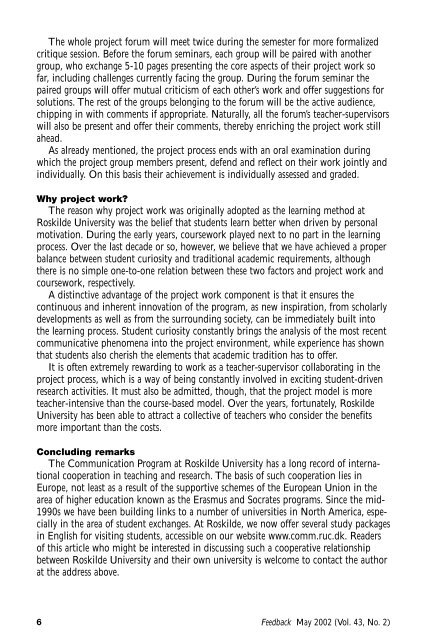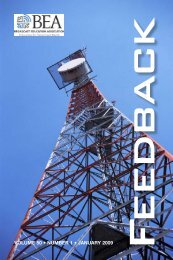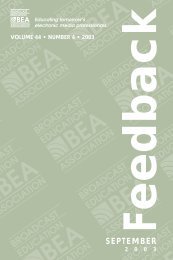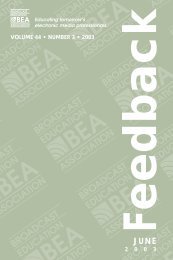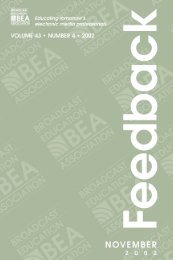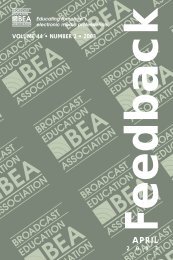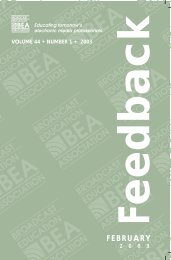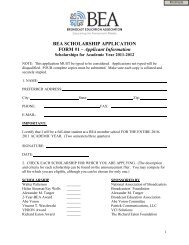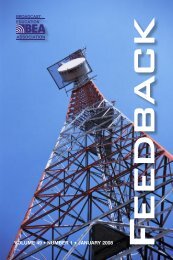Feedback May 2002 (Vol 43 No 2)
Feedback May 2002 (Vol. 43, No. 2) - Broadcast Education ...
Feedback May 2002 (Vol. 43, No. 2) - Broadcast Education ...
- No tags were found...
You also want an ePaper? Increase the reach of your titles
YUMPU automatically turns print PDFs into web optimized ePapers that Google loves.
The whole project forum will meet twice during the semester for more formalizedcritique session. Before the forum seminars, each group will be paired with anothergroup, who exchange 5-10 pages presenting the core aspects of their project work sofar, including challenges currently facing the group. During the forum seminar thepaired groups will offer mutual criticism of each other’s work and offer suggestions forsolutions. The rest of the groups belonging to the forum will be the active audience,chipping in with comments if appropriate. Naturally, all the forum’s teacher-supervisorswill also be present and offer their comments, thereby enriching the project work stillahead.As already mentioned, the project process ends with an oral examination duringwhich the project group members present, defend and reflect on their work jointly andindividually. On this basis their achievement is individually assessed and graded.Why project work?The reason why project work was originally adopted as the learning method atRoskilde University was the belief that students learn better when driven by personalmotivation. During the early years, coursework played next to no part in the learningprocess. Over the last decade or so, however, we believe that we have achieved a properbalance between student curiosity and traditional academic requirements, althoughthere is no simple one-to-one relation between these two factors and project work andcoursework, respectively.A distinctive advantage of the project work component is that it ensures thecontinuous and inherent innovation of the program, as new inspiration, from scholarlydevelopments as well as from the surrounding society, can be immediately built intothe learning process. Student curiosity constantly brings the analysis of the most recentcommunicative phenomena into the project environment, while experience has shownthat students also cherish the elements that academic tradition has to offer.It is often extremely rewarding to work as a teacher-supervisor collaborating in theproject process, which is a way of being constantly involved in exciting student-drivenresearch activities. It must also be admitted, though, that the project model is moreteacher-intensive than the course-based model. Over the years, fortunately, RoskildeUniversity has been able to attract a collective of teachers who consider the benefitsmore important than the costs.Concluding remarksThe Communication Program at Roskilde University has a long record of internationalcooperation in teaching and research. The basis of such cooperation lies inEurope, not least as a result of the supportive schemes of the European Union in thearea of higher education known as the Erasmus and Socrates programs. Since the mid-1990s we have been building links to a number of universities in <strong>No</strong>rth America, especiallyin the area of student exchanges. At Roskilde, we now offer several study packagesin English for visiting students, accessible on our website www.comm.ruc.dk. Readersof this article who might be interested in discussing such a cooperative relationshipbetween Roskilde University and their own university is welcome to contact the authorat the address above.6<strong>Feedback</strong> <strong>May</strong> <strong>2002</strong> (<strong>Vol</strong>. <strong>43</strong>, <strong>No</strong>. 2)


